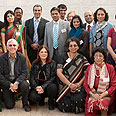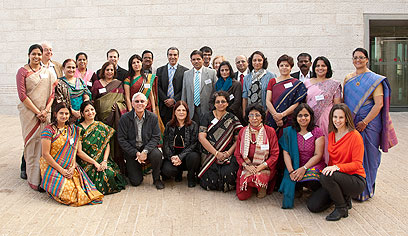
A group of 20 principals and teachers from India, Australia and Singapore have already arrived in Israel and are specializing at Yad Vashem's International School for Holocaust Studies. Groups of educators from New Zealand and Korea are expected to arrive later on.
The initiative to bring the group from India is shared by the Foreign Ministry, the Israeli Embassy in New Delhi and the Consulate General of Israel in Mumbai.
The Indian delegation, whose members arrived in traditional clothes, was brought to Israel in order to teach the Holocaust and its horrors as a lesson to humanity in schools and universities in India.
Some of the participants represent the largest independent educational network in India, which educates more than two million students from kindergarten to the age of university.

Indian educators at Yad Vashem (photo courtesy of Foreign Ministry)
The delegation was invited to Israel as part of a program led by the Foreign Ministry's Department for Combating Anti-Semitism at the Yad Vashem museum in Jerusalem, with the goal of reinforcing Holocaust studies across Asia.
"This goes to show just how many people in the world are interested in the subject of the Holocaust, which is definitely still relevant at the beginning of the 21st century," says Gideon Bachar, head of the Department for Combating Anti-Semitism at the Foreign Ministry.
Bachar adds that "in 2013 we are planning to expand Holocaust studies to countries which have never had organized Holocaust studies, like South Korea and Cyprus, and offer mobile instructions in India through a team of experts from Yad Vashem and the Foreign Ministry.
Anti-Semitic sentiments are hardly felt in Asia in general, and in India in particular, yet bookstores in India sell Adolf Hitler's autobiography, "Mein Kampf." In addition, many Indians idolize the Nazi leader, viewing him as a "strong man" without understanding his acts.
"For this reason it is so important to teach the Holocaust in this country," says Bachar.
The extensive use of Nazi symbols is also widespread in Asia. A convenience store in Taiwan, for example, issued key rings with Hitler's picture, but following protests by Israeli representatives the chain decided to stop selling the item.
In a school in Thailand students were photographed in Nazi uniform, giving a Nazi salute, during a field day. Following a Jewish-Israeli protest, the school decided to apologize for the incident.
The Jewish community in India was outraged recently after a clothing store named "Hitler" was opened in the Gujarat state. Following the intervention of the Foreign Ministry and India's small Jewish community, the store owners decided to change its name.
Israeli diplomats in Asia say that the use of Nazi symbols usually stems from ignorance rather than malice.
"Many people in Asia are not aware of what happened in Europe. Unfortunately, many think that Hitler was a hero rather than a monster, and that's why it is important for us to reinforce Holocaust education," explains a Foreign Ministry official.















